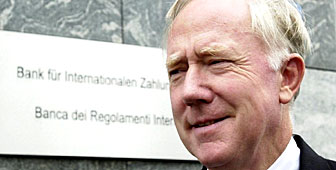BIS calls for tough action against accounting tricks

The Bank for International Settlements says "strong action" is needed to improve the quality of financial reporting.
The BIS’s president, Nout Wellink of the Netherlands, was speaking at the bank’s annual meeting on Monday in Basel. The bank is commonly known as the central bank for central bankers.
Wellink said the collapse of Enron and the fall from grace of WorldCom demonstrated that effective corporate governance could be undermined by incomplete and misleading information.
A string of United States companies have recently restated their profits, causing a crisis of confidence among investors. Two weeks ago, WorldCom admitted that it had overstated profits by $3.9 billion over the past five quarters.
Proper accounting
“There is much to examine in this area – the need for proper accounting for employee share options, recourse to opaque mechanisms to hide debt exposures, fictitious transactions to overstate sales and so on,” he said.
His comments underpinned conclusions in the annual report of the BIS which looked at the lessons to be learned from the Enron case and a host of other companies.
The report said the extent of Enron’s exposures could have been ascertained if the right questions had been asked. The problem was that no one asked, presumably because all seemed well, it commented.
It added that conflicts of interest could “seriously erode” the process of corporate governance, pointing out that in virtually every case where corporate reporting was found to be misleading, conflicts of interest could now be identified.
Word of caution
However, the report urged restraint in taking new measures to stamp out accounting irregularities.
It said that although there were a host of proposed solutions, markets seemed to be self-correcting and therefore any decisions about regulatory measures should only be taken “after due reflection”.
The US Congress is poised to pass new legislation aimed at limiting firms’ ability to massage their numbers. Analysts said new laws were likely to be blocked by industry friendly senators, but since WorldCom’s admission that it vastly overstated profits, tough new legislation has been revived.
The report said it remained to be seen whether efforts to restore the quality of information would reassure investors or “withstand the distortions that the next bull market will no doubt bring”.
Lessons from history
Wellink said that although equity market turbulence during the past weeks appeared to have weakened confidence in the global recovery, it was wise to look at the lessons of the past.
“At moments like this, it is important to stand back and remember that the world economy has successfully come through much worse situations,” he commented.
He said 2001 had been a “very difficult year” with the bursting of the IT bubble, recession in the United States and a sharp slowdown in global growth. The terrorist attacks of September 11 added to the gloom.
“One enduring legacy of these attacks has been a greater sense of political uncertainty, in particular with conflict in the Middle East and elsewhere.
“Many fear that this climate is exacerbating a wait-and-see attitude in the business community that could hold back investment,” he added.
The BIS report pointed out though that, despite the concerns, recent economic indicators had been encouraging with evidence of a moderate recovery under way in most major economies.
Short-term volatility
The general manager of the BIS, Andrew Crockett, said currency markets were likely to remain volatile in the short term but that the bank was not expecting disorderly conditions.
“We are not projecting or expecting disorderly conditions in the markets but there will be a certain amount of short term volatility,” he told a news conference.
After announcing that he would step down as general manager next March, Crockett said it was essential that central banks and monetary authorities kept markets informed about monetary policy so they could react to changes in an orderly manner.
“It is important that markets be managed and that the policies be such that markets can adapt gradually to changes and surrounding circumstances rather than being subject to abrupt changes,” he said.
by Robert Brookes

In compliance with the JTI standards
More: SWI swissinfo.ch certified by the Journalism Trust Initiative
You can find an overview of ongoing debates with our journalists here. Please join us!
If you want to start a conversation about a topic raised in this article or want to report factual errors, email us at english@swissinfo.ch.